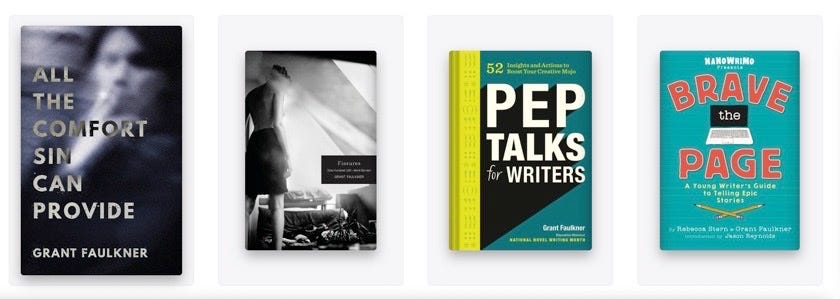The Decision: Competing Story Ideas
Part two in “Get ready to write a kick-ass novel in NaNoWriMo 2022"
Each week until the end of National Novel Writing Month in November, I’m going to write about a different creativity topic related to NaNoWriMo. If you’re not doing NaNoWriMo, don’t worry: all of the topics should relate to any creative project.
Every year about this time, I tend to be afflicted with two competing novel ideas dueling to be chosen for National Novel Writing Month, and I feel like I’m in a dilemma on the scale of Sophie’s Choice: Which novel idea (or child) do I choose?
I can draw up a pro/con list. I can light candles and meditate. I can call the 1-800 psychic hotline. But there’s never a clear answer.
I should view myself as fortunate. Because sometimes people have a tough time coming up with a single story idea that grabs them. Or they have a hard time truly believing in their story (warning: lack of faith in your story reduces the amount of joy you’ll experience in the writing).
This is an affliction that affects almost every writer I know. I recently interviewed Lan Samantha Chang for my Write-minded podcast, and she said that she writes what she calls “unusable material” for literally years before deciding on her next big project. If this is your style, you could use NaNoWriMo as simply your month to explore a novel idea (call it National Novel Exploration Month).
I’m going to try to answer all of those story decision questions and more with a collage of quotes in this second installment of “Get ready to write a kick-ass novel in NaNoWriMo 2022.” See the first installment here.
Do you have a story to tell?
"Everybody has a secret world inside of them. I mean everybody. All of the people in the whole world, I mean everybody—no matter how dull and boring they are on the outside. Inside them they've all got unimaginable, magnificent, wonderful, stupid, amazing worlds... Not just one world. Hundreds of them. Thousands, maybe."
—Neil Gaiman
Okay, we’ve got that covered, right? We are storytellers because we are human. Even if you’ve never written a novel, you are a storyteller. Stories are the way we navigate life, the way we touch and breathe, the way we think and feel. So don’t doubt that you are a storyteller—and don’t doubt you have a story that needs to be told.
How should you decide what to write about?
I’m asked this question a lot, and I always say the same thing: Choose the story that’s calling you. Don’t worry about what anyone else will think about it, or whether it’s “marketable”—or if it’s the story you “should” write. If you tell your story and tell it the way you want to tell it, your passion will be as powerful and eternal as Willy Wonka’s Everlasting Gobstopper.
Consider these quotes from wise souls on how to decide on a story to write:
“Be interested in what disturbs you.”
—Philip Petite
“Write the book you want to read.”
—Toni Morrison
“Write the book you want others to read.
—Matthew Salesses
“The germs of story ideas, then, can be little or big, simple or complex, fragmentary or rather complete, still or moving. The important thing is to recognize them when they come.”
—Patricia Highsmith
“The things that cause friction in your life are the things of which you might make art.”
—Naomi Shihab Nye
“Search for the cause, find the impetus that bids you write. Put it to this test: Does it stretch out its roots in the deepest place of your heart?”
—Ranier Maria Rilke
What will happen if you don’t tell your story?
“Can anything be sadder than work left unfinished? Yes; work never begun.”
—Christina Rossetti
A Prompt to Explore Your Story
Each week, I’m going to provide a prompt to help you get ready to write.
I recently interviewed Matthew Salesses as part of Banned Books Week events, and he provided a writing prompt from his book Craft in the Real World that was really interesting. In fact, I’m going to keep developing what I wrote in the 10-minute exercise (amazing how a simple prompt can sometimes spawn bigger things).
Make a list of your fears (nothing triggering, something irrational, i.e. a fear of dolls).
Write a fictional scene in which one of those fears plays out. Write in the voice of the person experiencing fear. How does this scene affect and change how your character sees the world?
Then, write the same scene from the voice of someone causing the fear, or perhaps from a non-active witness. What are the differences in word choice and tone between the points of view?
I bet after doing this exercise, you’ll have a novel idea in mind. Watch our whole discussion.
Because I’d love you to read one of my books
I write this newsletter for many reasons, but mainly just for the joy of being read and having conversations with readers. This newsletter is free, and I want it to always be free, so the best way to support my work is to buy my books or hire me to speak.
Because more about me
I am the executive director of National Novel Writing Month, the co-founder of 100 Word Story, and an Executive Producer of the upcoming TV show America’s Next Great Author. I am the author of a bunch of books and the co-host of the podcast Write-minded.
My essays on creative writing have appeared in The New York Times, Poets & Writers, Lit Hub, Writer’s Digest, and The Writer.
For more, go to grantfaulkner.com, or follow me on Twitter or Instagram.









I bought your book, "All The Comfort Sin Can Provide." I'm only a few pages in, but I like it so far. Thanks for the newsletter and for NaNoWriMo.